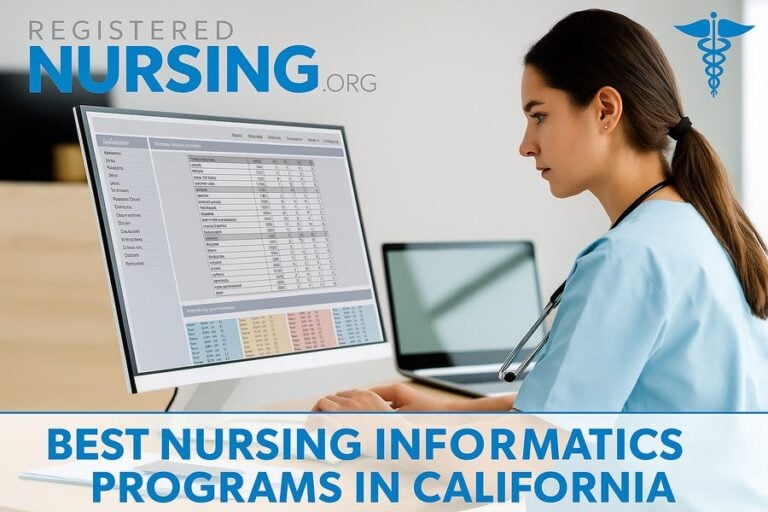Best Nursing Informatics Degree Programs in California

California’s position as a global technology hub combined with its massive healthcare system makes it an ideal place to launch or advance a nursing informatics career. From Silicon Valley’s health tech startups to major academic medical centers like UCLA Health, Cedars-Sinai, Stanford Health Care, and UC San Diego Health, California employers seek nurses who can bridge clinical practice and information technology. The state’s nursing informatics programs prepare graduates to design electronic health record systems, lead data analytics initiatives, ensure regulatory compliance, and implement AI-driven clinical decision support tools.
This article will cover:
- Master’s, doctoral, and post-master’s certificate pathways in nursing informatics
- Cost comparisons between California public universities, private institutions, and online programs
- Top employers and salary ranges across California regions from the Bay Area to Southern California
- Certification options including ANCC RN-BC and HIMSS credentials
- Program formats, flexibility, and considerations for working nurses
- California-specific regulations including CCPA compliance and BRN requirements
2026 Best Nursing Informatics Programs in California
California Baptist University
Riverside, CA - Private 4-year - calbaptist.edu
BSN to MSN - Master of Science in Nursing (Nursing Informatics)
Online & Campus Based - Visit Website
California Baptist University's hybrid Master of Science in Nursing with Nursing Informatics concentration equips advanced practice nurses to integrate nursing science with data management technologies. Designed for experienced RNs with master's degrees, this program emphasizes practical, evidence-based learning through practicum experiences. Requiring active RN license, minimum 3.0 GPA, and 17 credit units, it prepares graduates as informatics nurse specialists capable of enhancing patient care through digital tools. No entrance exams are required for this program that focuses on clinical decision-making and healthcare administration technology integration.
- Post-Masters Nursing Specialization
- Hybrid Program Format
- Minimum 3.0 GPA Required
- 17 Total Credit Units
- Active RN License Needed
- National Certification Eligible
- Integrates Nursing and Technology
- Practicum-Based Learning
- CPR Certification Required
Graduate Certificate - Nursing Informatics Post-Masters Curriculum
Online Learning - Visit Website
California Baptist University's Nursing Informatics Post-Masters program prepares experienced RNs with master's degrees to lead healthcare technology innovations. This online curriculum requires an active RN license, minimum 3.0 GPA, and includes 225 clinical hours. Students develop expertise in healthcare systems, technology workflow, and project management through five specialized informatics courses. The program prepares graduates for national certification and does not require entrance exams, focusing on bridging clinical practice with cutting-edge information management strategies to transform digital health delivery.
- Post-Masters Nursing Informatics
- Requires active RN License
- Minimum 3.0 GPA required
- 225 clinical hours included
- 5 specialized informatics courses
- National certification preparation
- CPR certification needed
- Background check required
- Must have MSN degree
- Prerequisites with B- minimum
University of San Diego
San Diego, CA - Private 4-year - sandiego.edu
MSN to DNP - Doctor of Nursing Practice (Nursing Informatics and Data Science)
Campus Based - Visit Website
The University of San Diego's Doctor of Nursing Practice in Nursing Informatics and Data Science focuses specifically on preparing advanced practice nurses to transform healthcare through technology and data science. This campus-based program requires students to attend campus a minimum of two days weekly while developing expertise in healthcare information systems, data analysis, and technology integration. The curriculum emphasizes translational science projects and leadership preparation for driving innovation in healthcare technology. With a minimum 3.0 GPA requirement and preference for one year of clinical experience, this doctoral program does not require entrance exams, positioning graduates to improve patient outcomes through data-driven healthcare solutions.
- 78-83 total program units
- Full or part-time enrollment
- Minimum 3.0 GPA required
- One year clinical experience preferred
- Campus-based program
- Minimum two campus days weekly
- Advanced clinical practice focus
- Technology and data science concentration
- Doctoral-level leadership preparation
- Translational science project required
National University
San Diego, CA - Private 4-year - nu.edu
BSN to MSN - Master of Science in Nursing (Nursing Informatics)
Online & Campus Based - Visit Website
National University's Master of Science in Nursing with a Nursing Informatics specialization integrates advanced nursing practice with health information technology, preparing nurses to enhance patient care through data-driven approaches. This hybrid program offers flexibility for working professionals, focusing on designing, implementing, and evaluating health information systems while fostering interdisciplinary collaboration. It emphasizes evidence-based practice and technological innovation to improve clinical outcomes and safety. As a master's-level program, it requires an entrance exam, and it is CCNE-accredited, with highlights including a hybrid learning format, health IT focus, and advanced technology skills development.
- Hybrid learning format
- Interdisciplinary health IT focus
- CCNE-accredited program
- Interprofessional education approach
- Advanced nursing technology skills
What Is Nursing Informatics and Why California?
Nursing informatics specialists integrate nursing science, computer science, and information science to manage and communicate healthcare data. They oversee Electronic Health Record (EHR) implementations, develop clinical workflows, analyze population health data, ensure interoperability between systems, train clinical staff on new technologies, and leverage data to improve patient outcomes.
California’s healthcare landscape creates exceptional demand for nursing informatics expertise. The state is home to Kaiser Permanente, one of the nation’s largest integrated healthcare systems and a leader in health IT innovation. California also enforces strict health data privacy regulations, including the California Consumer Privacy Act (CCPA), requiring informatics nurses who understand both federal HIPAA requirements and California-specific mandates.
According to the Bureau of Labor Statistics, medical and health services managers in California earn a median annual wage of approximately $139,000. Entry-level informatics nurses in California typically start around $95,000 to $110,000, while experienced specialists and directors can earn $150,000 to $200,000 or more, particularly in the Bay Area and Los Angeles metro regions.
Degree Pathways in Nursing Informatics
Master’s Degrees (MSN in Nursing Informatics)
Master’s programs provide foundational education for RNs transitioning into informatics roles. California MSN programs typically require 36 to 48 credits and can be completed in 18 to 24 months of full-time study, though most working nurses pursue part-time tracks over two to three years.
Core curriculum typically includes:
- Health information systems and technology
- Database design and management
- Clinical workflow analysis and optimization
- Data analytics and visualization
- Project management for health IT implementations
- Regulatory compliance (HIPAA, Meaningful Use, California privacy laws)
- Change management and clinical training strategies
Most California MSN programs offer online or hybrid formats with minimal on-campus requirements. Programs may require a capstone project where students work on real-world informatics initiatives, for example, optimizing sepsis alert systems at a partner hospital or implementing patient portal enhancements at a community health center.
Doctoral Degrees (DNP and PhD in Nursing Informatics)
Doctor of Nursing Practice (DNP) with Informatics Focus:
DNP programs emphasize applied practice and systems leadership. California DNP students complete quality improvement projects addressing real organizational challenges, such as reducing clinical documentation burden through EHR optimization or implementing predictive analytics for patient deterioration in ICU settings. These programs typically require 30 to 42 post-master’s credits and take two to three years part-time.
PhD in Nursing with Informatics Concentration:
PhD programs focus on research and scholarship, preparing graduates for faculty positions or research scientist roles. Students conduct original research on topics like the impact of clinical decision support on prescribing patterns or health equity implications of algorithm-driven care delivery. California PhD programs typically require three to five years and include dissertation research often conducted in partnership with major health systems.
Post-Master’s Certificates in Nursing Informatics
Post-master’s certificates allow nurses who already hold an MSN, DNP, or PhD in another specialty to add informatics credentials without completing a second full degree. These focused programs typically require 12 to 18 credits and can be completed in one year.
Ideal for:
- Nurse practitioners seeking to transition into informatics leadership
- Nurse educators wanting to specialize in health IT training
- Clinical nurse specialists adding informatics to their portfolio
- Nurse administrators preparing for Chief Nursing Information Officer (CNIO) roles
California nursing informatics post-master’s certificates often align with the American Nurses Credentialing Center (ANCC) Nursing Informatics Certification exam content, preparing graduates to sit for the RN-BC credential in informatics.
Key Factors to Consider for California Students
Accreditation and Certification Eligibility
Ensure programs hold accreditation from the Commission on Collegiate Nursing Education (CCNE) or Accreditation Commission for Education in Nursing (ACEN). Graduates of accredited programs are eligible to sit for national nursing informatics certification through ANCC or the Healthcare Information and Management Systems Society (HIMSS), credentials that strengthen employability in California’s competitive market.
Cost Comparison: Public vs. Private Programs
| Program Type | Estimated Cost Range | Notes |
| California State University (CSU) MSN | $18,000–$28,000 total | In-state tuition; limited informatics specializations |
| University of California (UC) MSN | $35,000–$50,000 total | Strong research focus and health system partnerships |
| Private University MSN | $45,000–$70,000 total | Often offer specialized tracks and smaller cohorts |
| Out-of-State Online MSN | $25,000–$55,000 total | Must verify California state authorization |
| DNP Programs | $40,000–$90,000 total | Varies widely; UC and private schools typically higher |
| Post-Master’s Certificate | $8,000–$18,000 total | Most cost-effective for adding specialty |
California residents benefit from significantly lower tuition at CSU and UC campuses. However, some CSU campuses may not offer dedicated nursing informatics tracks. Always confirm whether the program offers a distinct informatics specialization or certificate.
Format and Flexibility
Most California nursing informatics programs accommodate working professionals through:
- Fully online asynchronous coursework
- Hybrid models with occasional weekend intensives in major cities
- Evening or weekend synchronous sessions
- Accelerated eight-week terms rather than traditional semesters
Programs affiliated with California’s major health systems may offer site-based learning opportunities, allowing students to complete projects or practicums at facilities where they already work.
California-Specific Career Considerations
Major Employers and Health Systems
California’s largest healthcare employers actively recruit nursing informatics specialists:
- Kaiser Permanente: Known for industry-leading EHR systems and integrated care models
- Sutter Health: Northern California network with ongoing digital transformation initiatives
- Cedars-Sinai: Los Angeles-based system with innovation centers and AI research programs
- Stanford Health Care: Academic medical center at the forefront of precision medicine and data science
- UC Health Systems: Five academic medical centers across California conducting cutting-edge informatics research
- Dignity Health/CommonSpirit: Major Catholic health system with extensive California presence
Learn more about nursing informatics careers.
Geographic Salary Variations
Informatics nursing salaries vary significantly across California regions:
- San Francisco Bay Area: $115,000–$180,000+ (highest salaries but also highest cost of living)
- Los Angeles/Orange County: $100,000–$160,000
- San Diego: $95,000–$150,000
- Sacramento/Central Valley: $90,000–$140,000
- Inland Empire/Rural Areas: $85,000–$130,000
Remote work opportunities have expanded, allowing California-licensed informatics nurses to work for out-of-state employers while living in lower-cost California regions.
Certification and Professional Development
California nursing informatics professionals commonly pursue these credentials:
- NI-BC in Nursing Informatics (ANCC): Requires 2,000 hours of informatics practice or 12 semester hours of academic credit
- CAHIMS (Certified Associate in Healthcare Information and Management Systems): Entry-level HIMSS credential
- CPHIMS (Certified Professional in Healthcare Information and Management Systems): Advanced HIMSS credential
- PMP (Project Management Professional): Valuable for nurses leading large-scale implementations
Making Your Decision
When evaluating California nursing informatics programs, prioritize these factors:
Academic Fit:
- Does the curriculum align with your career goals (clinical informatics, leadership, research, analytics)?
- Are faculty actively involved in California health systems or informatics research?
- What capstone or practicum experiences are offered?
Financial Considerations:
- What is the total program cost including fees?
- Are you eligible for in-state tuition at public universities?
- Does your employer offer tuition reimbursement for informatics education?
Career Services and Network:
- Does the program have partnerships with California health systems for job placement?
- Are alumni working in roles and organizations you aspire to join?
Accreditation and Outcomes:
- Is the program accredited by CCNE or ACEN?
- What percentage of graduates are employed in informatics roles within six months?
Frequently Asked Questions
Q: Do I need programming or coding experience to succeed in a nursing informatics program?
A: Most programs assume no prior programming knowledge and teach necessary technical skills from the ground up. You’ll learn database concepts, basic SQL queries, data visualization tools, and health IT standards, but you won’t be writing extensive code. However, comfort with technology and willingness to learn new software is essential.
Q: Will my California RN license be sufficient, or do I need additional state certifications?
A: An active, unrestricted California RN license is sufficient to practice nursing informatics. Unlike advanced practice roles, informatics nursing doesn’t require APRN licensure. However, national certification (NI-BC in Nursing Informatics through ANCC) significantly enhances career prospects and is often preferred by employers for leadership positions.
Q: How does California’s consumer privacy law (CCPA) impact nursing informatics practice?
A: The California Consumer Privacy Act and California Privacy Rights Act (CPRA) impose strict requirements on how organizations collect, use, and share personal information, including health data. While HIPAA remains the primary healthcare privacy framework, CCPA adds California-specific obligations. Nursing informatics professionals in California must understand both federal and state privacy laws, making this knowledge a competitive advantage.
Q: Are there clinical hour requirements or clinical placements in nursing informatics programs?
A: Unlike nurse practitioner programs, nursing informatics degrees typically do not require clinical hours with preceptors. Instead, programs include applied practicums or capstone projects where students work on real-world informatics initiatives, often at their current workplace. These experiences are project-based, focusing on system implementations, workflow optimization, or data analysis rather than direct patient care.
Latest Articles & Guides
One of the keys to success as a registered nurse is embracing lifelong learning. Our articles and guides address hot topics and current events in nursing, from education to career mobility and beyond. No matter where you are on your nursing journey, there’s an article to help you build your knowledge base.
Browse our latest articles, curated specifically for modern nurses.



